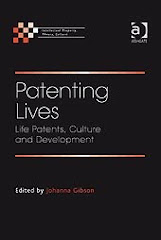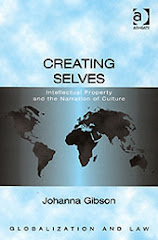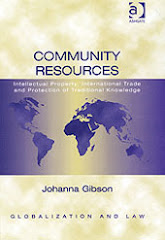Intellectual property news has a strange propensity for the "copy" - not only in copyright but also in patents. However, what is of particular interest in recent news is where the copy itself becomes the item of enhanced value - the case of cloned animals. For biotechnology, the "copy" is the original value in itself. But the technology aside, the general "mis-trust" of the copy is an interesting aspect of debates, ranging from the welfare of pets to the safety of steak trays in the supermarket.
 Copy Cat
Copy CatIn the recent news, the birth of kittens to the world's first cloned cat, CC (pictured at right), and the news of Dundee Paradise, born to the clone of a champion dairy cow, has generated substantial debate concerning food safety and animal welfare.
CC, short f
 or reportedly both Copy Cat and Carbon Copy (not even copies are accurate?), was born 5 years ago in December 2001 at the Texas A&M University, being a copy of the calico domestic shorthair cat, Rainbow (pictured at left).
or reportedly both Copy Cat and Carbon Copy (not even copies are accurate?), was born 5 years ago in December 2001 at the Texas A&M University, being a copy of the calico domestic shorthair cat, Rainbow (pictured at left).The CC was then born to and raised by Allie, the tabby surrogate mother (pictured at right) meeting with both acclaim a
 nd controversy.
nd controversy.And in fact, on the "inaccuracy" of cloning, CC grew up neither to look nor to act like her mother, showing that environmental and non-genetic factors continue to be significant in determining the ultimate phenotype. In fact, fur patterning might have more to do with Allie's womb. A predisposition, in other words, should not be made a pathology.

And now CC has had 3 kittens of her own (pictured at left).
 However, CC achieved motherhood "old school" with Smokey, a male tabby bought as a partner for CC by Duane Kraemer (pictured at right), match-maker and professor of veterinary medicine at Texas A&M and member of the original cloning team. Mother and kittens are reportedly doing fine.
However, CC achieved motherhood "old school" with Smokey, a male tabby bought as a partner for CC by Duane Kraemer (pictured at right), match-maker and professor of veterinary medicine at Texas A&M and member of the original cloning team. Mother and kittens are reportedly doing fine.Hokey Holsteins
Before Christmas, the Holstein calf, Dundee Paradise, was born. Dundee Paradise is the daughter of a clone produced by US company Cyagra
 Clone, using cells from a champion Holstein cow (Holsteins are bred for their milk production).
Clone, using cells from a champion Holstein cow (Holsteins are bred for their milk production).But copies are inherently valuable, Dundee Paradise is reported to have been sold for £14 700 (although elsewhere the figure is reported to be much higher) to Princess Noora bint Isa al-Khalifa, of the Bahrain royal family. It is reported that the calf is being raised at a farm in Wales.
Reports, including the Guardian and Food Production Daily, have described the urgent concerns for the UK Food Standards Agency (FSA). The FSA met with European Officials Friday to decide whether tests would be required before marketing milk and meat from cloned animals. The European Regulation EC No 258/97 sets out the rules for authorising novel foods and novel food ingredients for marketing and consumption. The review of this Regulation is underway, with an online Consultation launched in June 2006, with a legislative proposal to be prepared this year. The earlier evaluation report of 2004 recommended further work to determine whether food from cloned animals should be treated as novel. At present, there is no specific regulatory framework for dealing with food and food ingredients from cloned animals.
The US Food and Drug Administration (FDA) approved the sale of cloned meat in US supermarkets late last year. The Independent reports that the draft rule allow
 s the sale of meat and milk without requirements to state the origin on the labels. According to The Times, is thought it will be in supermarkets within months. However, the Telegraph suggests that most of the cloned animals will be reserved for breeding, with the offspring going to market. While welcomed by some groups, including the Biotechnology Industry Organisation (BIO), the approval has provoked significant criticism from consumer groups as well as experts in food safety. Furthermore, concerns for the welfare of cloned animals have been raised since the heady days of Dolly the Sheep (Dolly, pictured at right with her foster mum).
s the sale of meat and milk without requirements to state the origin on the labels. According to The Times, is thought it will be in supermarkets within months. However, the Telegraph suggests that most of the cloned animals will be reserved for breeding, with the offspring going to market. While welcomed by some groups, including the Biotechnology Industry Organisation (BIO), the approval has provoked significant criticism from consumer groups as well as experts in food safety. Furthermore, concerns for the welfare of cloned animals have been raised since the heady days of Dolly the Sheep (Dolly, pictured at right with her foster mum).It is notable that th
 e debate focuses attention on the relevance of consumer confidence and choice. Peter Melchett (pictured at left, photo courtesy of the Soil Association), policy director of the Soil Association, was quoted in Daily Telegraph as saying that the lack of regulation was "inexcusable," and "will undermine trust in British farming and British food." Calling for a moratorium on cloned animals, he described the current situation as "irresponsible and bad for the industry."
e debate focuses attention on the relevance of consumer confidence and choice. Peter Melchett (pictured at left, photo courtesy of the Soil Association), policy director of the Soil Association, was quoted in Daily Telegraph as saying that the lack of regulation was "inexcusable," and "will undermine trust in British farming and British food." Calling for a moratorium on cloned animals, he described the current situation as "irresponsible and bad for the industry."The Guardian reports that the FDA's approval has not translated into consumer confidence, and notes that the FDA plans to continue public consultations until April this year. In particular, the absence of obligations to disclose the origin of the food product has generated objections among activists both in food safety and the environment.
In an article in Nature, 8 January, US and Japanese researchers claim that cloned meat should not be treated differently, and advocate somatic cell nuclear transfer (SCNT) as the only means by which ensure survival of the genetic characteristics of the highest value animal. However, the lessons from Copy Cat make clear that not all desirable traits are necessarily guaranteed by the duplication of genotype.
Further, the "economic" interests of high value animals captures neither the consumer interests identified by Melchett, nor the ethical concerns for the welfare of the animals involved. As the GM debate in Europe has shown, many developments in the organic market reflect specific cultural and social concerns of Europeans. Despite the WTO Panel Decision on the complaints by the US, Canada and Argentina concerning the so-called moratorium on GM food in Europe, Austria has been allowed to maintain its ban on genetically modified crops, Austria has recently retained its right to ban GM corn by relying on the Biosafety Protocol. The Protocol allows such a ban where there is a lack of scientific certainty over the safety of the crop. The US has not signed the Protocol, and Canada and Argentina, although signatories, have not ratified the Protocol (signatures and ratifications).
It is this dimension of the market for organic food that was missed by David Miliband, UK Secretary of State for Environment, Food and Rural Affairs, when he told the Sunday Times recently that organic produce is "no better." The outcry was such that Miliband responded with praise for the "entrepreneurship" of organic farming in his blog. But again, to characterise the success of the organic food industry this simplistically dismisses the activity of consumers as nothing more than a "lifestyle choice." With respect to the environment, consumers are acting as citizens rather than making choices simply from the perspective of cost or prestige. As The Independent points out, David Miliband is surely "playing to the gallery" of the many farmers not using organic methods: "Instead of mocking this trend as unscientific, or jeering at it as a 'lifestyle' choice, which makes it sound like a slightly silly, magazine fashion, Mr Miliband would do better to praise it."

(Guest consultant on feline aspects: Roman the Cat)



1 comment:
Nice fill someone in on and this mail helped me alot in my college assignement. Thank you as your information.
Post a Comment